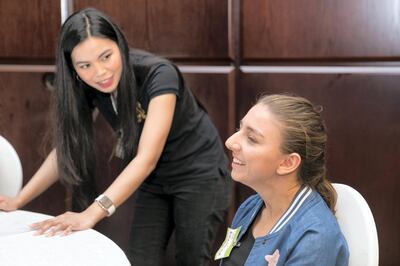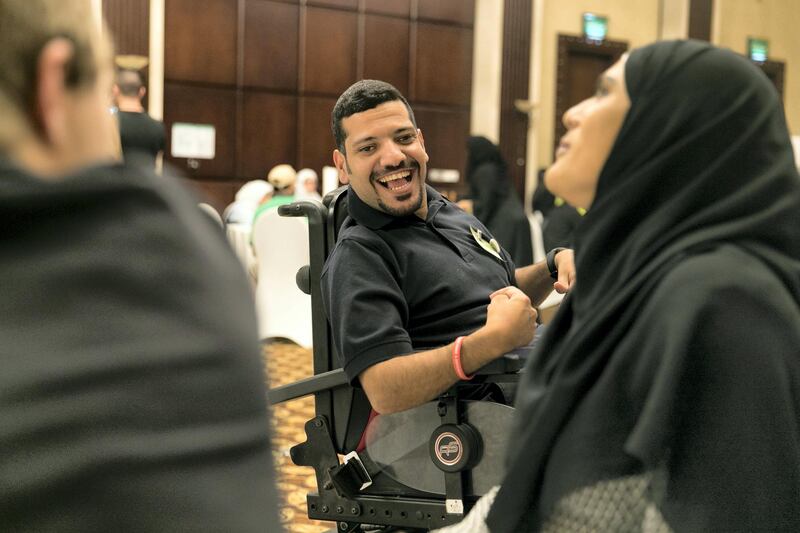Visitors to the Mena Special Olympics in two weeks will be greeted by trained volunteers with developmental disabilities in what aid workers have described as a first for the region.
Around 70 residents with intellectual disabilities have signed up to guide visitors around the mega event in Abu Dhabi.
The groups are being trained to interact with the public, talk to the media and point out directions to people.
“The training is just a start. We have invited young adults who are able to participate independently. They could also be from a centre or school and their teachers or coach will be with them to support them,” said Renate Baur-Richter, programme manager at Sedra Foundation in Abu Dhabi.
The centre for research facilitates the integration of people with disabilities in schools and the workplace.
The ninth Middle East and North Africa regional games runs from March 14 to 23 and will act as preparation for the Special Olympics World Games next year.
The government’s aim is to engage people with disabilities across the country, empower them and spread awareness on the need for inclusion.
For the special needs community, it presents an opportunity to learn new skills.
_______________
Read more:
UAE Sports Federations ready themselves for Special Olympics
Abu Dhabi to host regional Special Olympics next year in run up to 2019 main event
_______________
“They could be working behind a desk or greeting visitors. It will show them how to cope with stress because there will be some pressure even if it is positive stress. They will have to learn to deal with the public, work in an area with so many people who are strangers and at the same time cope and navigate their role as volunteers,” Ms Baur-Richter said.
Emirati Ahmed Al Qubaisi had never heard of the Special Olympics before, but seeing the opportunity to learn, he now motivates others to volunteer their time like he does.
The 31-year-old, who has cerebral palsy and uses a wheelchair, said being a volunteer will help him “give back to the community and help learn time management, be more patient, learn self-management.” He is also looking for internship openings.
Reaching out through centres and family support groups, Sedra has outlined the benefits of the experience including fun educational training and support on-site at the games.
The plan over the next year is to organise similar training sessions in other emirates in the lead up to the World Games.
While 70 volunteers with cognitive disabilities may appear a small number, it is the first time the community is coming together from across the country.
Maja Eckmeyer-Bandak said her daughter Lea, 20, was excited about volunteering.
Lea has limited comprehension abilities but interacts well with people and is part of Sedra’s youth club. She volunteers in an Abu Dhabi hospital and travels twice a week to Dubai by bus and metro to the Mawaheb art studio.

“This is her first time as a volunteer and she loves it because whenever she gets to do something with people she is super excited,” said Lea’s mother.
“It’s very important for Lea and others to learn social manners, how to speak with the public, to approach people, to overcome stage fear. There aren’t many opportunities for people with special needs in this country so maybe this will open things up.”
In the first training session on Thursday (Feb 22), that lasted more than two hours, separate stations were set up for both Arabic and English speakers to talk volunteers through grooming, presentation and even media skills.
Sedra staff gave examples of team work and the need to follow instructions.
Media training involves talking to press reporters and photographers about the purpose of the photo or interview.
Some volunteers are young adults; others are 40-year-olds who are participating in a group event for the first time.
“This in itself is a success because we are seeing people we have never met before,” Ms Baur-Richter said.
“We believe this project is a head start. Our aim is to establish a platform beyond the sports that can make them independent and provide work readiness. This can really be a movement for ongoing and lifelong training. It can open up opportunities for jobs.”
For information on becoming a volunteer, send an email with your contact details to: info@sedra.org







